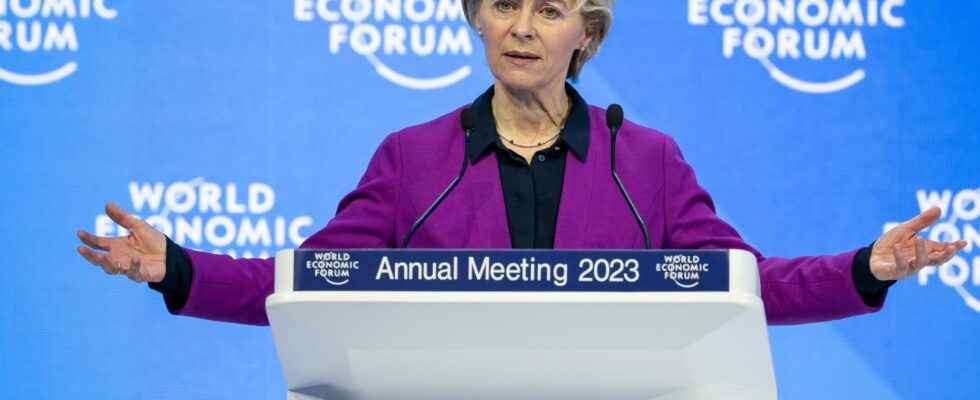European Commission President Ursula von der Leyen on Tuesday (January 17th) in Davos reaffirmed her plan for a “European sovereignty fund” to support EU industry in the face of Chinese and American state aid from the reduction law. inflation (IRA). This fund would complement a series of measures envisaged, in particular a new temporary and targeted relaxation of the rules limiting State aid which, without accompanying measures, would risk fragmenting the single market.
This easing, by opening the floodgates of national subsidies, would mainly benefit the large rich countries like Germany and France which would be able to favor their companies to the detriment of those of other countries, an unfair competition that Brussels claims to want to rule out. France and Germany have indeed accounted for 53% and 24% respectively of state aid notified to Brussels since March 2022 as part of the easing linked to the war in Ukraine, against only 7% for Italy, which comes third.
A structural solution
“In the medium term, we are going to prepare a European sovereignty fund as part of the mid-term review of our budget which will take place later this year”, declared Ursula von der Leyen, during the first day of debates organized by the World Economic Forum (WEF), without however specifying how this fund would be financed. “This is a structural solution that will increase the resources available for upstream research, innovation and essential strategic industrial projects” in the green transition, continued the head of the European executive. “But because it will take time, we will seek a transitional solution to provide rapid and targeted support where it is most needed,” she added.
This transitional solution will consist in reallocating already existing funds, specified the Commissioner for the Internal Market, Thierry Breton, referring to a basket of instruments to meet the different needs of the Member States which do not all have the same budgetary strike force. This basket could include, according to him, remaining financing from the European recovery plan of 800 billion euros (NextGenerationEU) and loans from the European Investment Bank (EIB).
It could also include a “Sure” type mechanism, a European instrument which made it possible during the recession linked to the Covid-19 pandemic to support partial unemployment measures in Member States in need. It consisted of loans on favorable terms financed by borrowings from the European Commission on the financial markets.
Paris in support of von der Leyen
France is fully behind this project. In a ten-page document submitted to the European Commission – that Les Echos were able to consult -, Paris draws up the outlines of its “made in Europe strategy” aimed at responding to the 369 billion dollars in subsidies that the United States has decided to allocate to their green industries. “It is an effort which is around two points of GDP”, launched Emmanuel Macron last December, addressing the subject during a press conference at the end of the European Council.
France is advancing a battery of shock measures to reassure European companies worried about having to deal with a massive movement of relocations. The sovereignty fund is on the front line. For France, it should be launched in two stages. With “an emergency fund”, created “in the very short term by relying on existing funding”, which would precede a “complete” sovereignty fund supposed to be operational before the end of 2023. Paris cites in particular all or part of the 365 billions of the “allocated and not yet disbursed” Recovery and Resilience Facility (RRF) which could be reallocated to strategic EU sectors.
The idea of such a fund, based on pooled financing at EU level, had already been formulated by Ursula von der Leyen but came up against the hostility of several member countries, including Germany, net contributors to the European budget worried about seeing their bills increase further. The President of the European Commission must present her proposals to support European industry by the end of January, before a European summit of Heads of State and Government on February 9 and 10. She reaffirmed on Tuesday that the Commission would propose “to temporarily adapt (its) rules on state aid”. These have already been relaxed “temporarily” in 2020 during the pandemic, then in 2022 in the context of the war in Ukraine.
